Coronavirus Australia live news: Feds secure 20m extra Pfizer vaccines: Scott Morrison
PM Scott Morrison says the overnight agreement would ensure Australia would now have access to 40m Pfizer jabs this year.
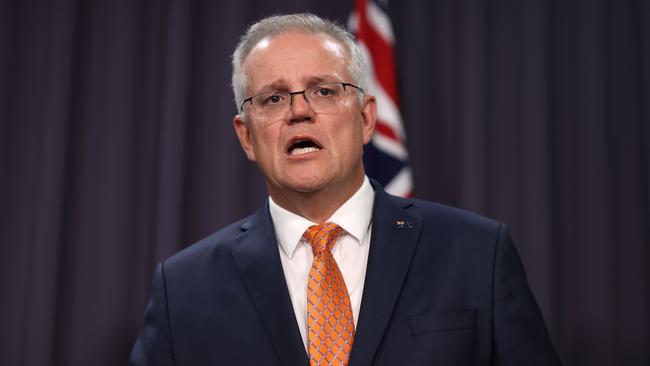
- Aus to get extra 20m Pfizer jabs
- Nothing off table in jab rollout
- Victorian quarantine staff refuse vaccine
- Call to ease foreign student work visa limits
- Blood clot fears force AstraZeneca switch
Welcome to live coverage of political news as the nation responds in the fight against the COVID-19 pandemic.
Scott Morrison says an overnight agreement will ensure Australia will now have access to 40m Pfizer jabs this year. NSW Health is temporarily pausing the administration of the AstraZeneca vaccine to all age groups while it updates its informed consent information.Calling on Australians to maintain confidence in the vaccination program, Chief Medical Officer Paul Kelly suggests a deal with Moderna is being considered among other measures.
Jess Malcolm11.15pm:Review launched into Johnson & Johnson vaccine
The EU’s drug regulator has launched a review of possible links between the Johnson & Johnson COVID-19 vaccine and blood clots after reports of four cases, one of them fatal.
The European Medicines Agency (EMA) said on Friday that its safety committee “has started a review of a safety signal to assess reports of thromboembolic events” with people who had received the shot.
“Four serious cases of unusual blood clots with low blood platelets have been reported post-vaccination with Covid-19 Vaccine Janssen,” the EMA said, referring to US pharma giant J&J’s European subsidiary.
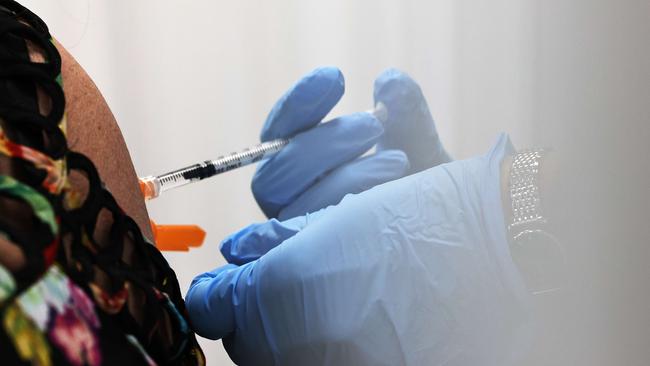
“One case occurred in a clinical trial and three cases occurred during the vaccine rollout in the USA. One of them was fatal.”
The watchdog has approved the Johnson & Johnson vaccine for use but its rollout across 27 countries in the EU is not due to start until later this month.
The probe comes days after the Amsterdam-based watchdog said it was listing the same type of blood clots as a very rare side effect of the rival AstraZeneca vaccine.
Australia does not have any contracts for this vaccine.
READ MORE: Cholestrol pills could tackle cancer in devils, humans
Jess Malcolm8.00pm:‘Steady as she goes’ in vaccine rollout
Health authorities believe the timeline for vaccinating the nation’s most vulnerable people will be will largely unaffected by recommendation that under-50s receive the Pfizer rather than the AstraZeneca jab.
But the government cannot say if the switch to Pfizer for younger people will cause a blowout in waiting times for the less at-risk members of the community.
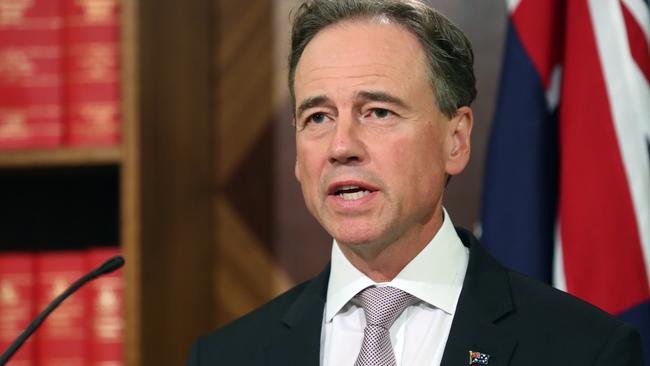
Scott Morrison announced the government had secured an extra 20 million Pfizer jabs in the wake the decision to recommend it rather than AstraZeneca for under-50s.
But many of the extra doses will not become available until the final three months of the year.
The federal government had anticipated four million doses would be administered by the end of March, and all Australians vaccinated by October.
READ MORE: Safety to top agenda at national cabinet
Agencies7.08pm:India’s hardest-hit state battles huge vaccine shortages
Leading hospitals in India’s most coronavirus-hit state halted vaccinations Friday, citing shortages as infections across the country crossed 13 million and set a new daily record.
The nation of 1.3 billion is confronting a ferocious second wave that has brought the fastest infection rate since the pandemic began, with nearly 132,000 cases recorded in the past 24 hours.
In the financial and film hub of Mumbai, one out of three private hospitals administering jabs ran out of supplies Thursday, city authorities said.
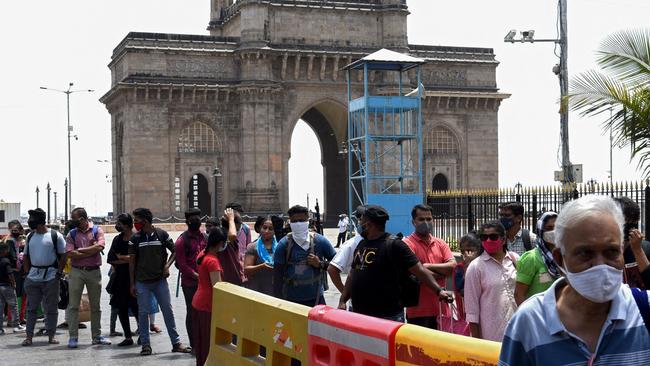
The situation at government-run inoculation centres was not much better, with a giant 1,000-bed field hospital turning away people arriving for their first dose on Friday morning.
“There is a shortage of vaccines so the programme has been halted,” Heeba Patwe, a doctor at a facility inoculating 5,000 people daily, told AFP.
India’s vast vaccination programme -- which has already administered 94 million shots -- is reportedly facing major supply snags in the quest to inoculate its huge population.
READ MORE:Life gets back on track in Israel
James Kirby 6.21pm:Could house prices fall next year?
Just when absolutely everyone is buzzed up on the prospect of escalating house prices the killjoys arrive armed with some sobering forecasts: they think prices will drop next year.
What! So soon?
Every weekend we hear of ludicrous scenes at auctions where rival bidders slug it, out pushing prices higher than estimates.
And we all know that waiting for prices to drop has been a loser’s game for most people, most of the time.
What’s more, we have recently endured the rarest of events — the double dip — when house prices fell 3 per cent in 2015 and then managed a 15 per cent tumble over the years 2017 to 2019.
Still, there are plenty of reasons to be sceptical of this latest boom, even if the major banks are suggesting prices will lift by 20 per cent.
Jack the Insider5.35pm: Media noise hides good news on the vaccine rollout
There was all manner of politicised babble in the wake of the government’s vaccine announcement on Thursday night, much of it of the opportunistic look through the rearview mirror type.
The Prime Minister, Scott Morrison and Health Minister, Greg Hunt have acted on advice and recommended that those under 50 should opt for vaccines (at this stage the Pfizer vaccine but others are coming) rather than the AstraZeneca vaccine due to emerging data that younger members of the community, particularly in their 20s, faced a heightened but still extremely low risk of blood clotting and thrombotic episodes.
Cue sound and fury. It was said the Morrison government had stuffed up the rollout. The delays would curtail Australia’s economic recovery. The country would remain locked away with international travel an option only for a lucky few. Most of all, the government had put too many eggs in the AstraZeneca basket.
Well, possibly but these decisions are a damned side harder to make with foresight rather than in hindsight.
Mostly, the noise hid one salient fact.
Read more from Jack the Insider here.
AFP5.14pm:Brazilian Senate to probe handling of pandemic
The Brazilian Senate will open an inquiry into the government’s handling of the coronavirus pandemic, as President Jair Bolsonaro continues to resist lockdown measures even with Covid-19 deaths at new records.
A judge from the country’s supreme court on Thursday ordered the Senate to create a commission for the inquiry, after requests from 32 of Brazil’s 81 senators.
The president of the Senate, Rodrigo Pacheco, finally conceded to their demands at a press conference minutes after the judge’s ruling, after having opposed the move previously.
Far-right leader Bolsonaro has defied expert advice on containing the pandemic even as cases and deaths in Brazil soar, criticizing face masks and vaccines while doubling down on his opposition to lockdown measures as recently as Wednesday.
On Thursday Brazil recorded over 4,200 coronavirus deaths in 24 hours, bringing its total toll to more than 345,000 – the second highest in the world after the United States.
Remy Varga4.45pm: Victoria hits pause on vaccine for under-50s
The Victorian government has advised health services not to give the AstraZeneca vaccine to people under the age of 50, following the Commonwealth’s announcement last night.
Victoria’s Health Department has also asked health services to reschedule any appointments with people under the age of 50 who are booked in to receive the AZ jab between Friday and Monday.
“Eligible persons who are booked to receive their second dose of AstraZeneca, including people aged under 50 years, with no major adverse reaction, should receive their second dose as planned,” a DH spokesperson said.
“This is safe and is recommended by ATAGI.”
The DH spokesperson said they were waiting to receive consent forms and consumer information from the Commonwealth before AztraZeneca vaccines could resume.
Angie Raphael3.50pm: WA changes NZ border rule; venues back to capacity
New Zealanders will soon enjoy quarantine-free travel to Western Australia and if the state shuts again to other jurisdictions it will slash the number of days of no community transmission needed to reopen.
Under changes announced on Friday, a jurisdiction that is deemed a “low risk” will move to a “very low risk” after 14 days of no community spread of COVID-19, rather than 28 days.
From midnight on April 19, Western Australia will also treat New Zealand like any other jurisdiction and classify it as “very low risk”, which will effectively create a trans-Tasman travel bubble.
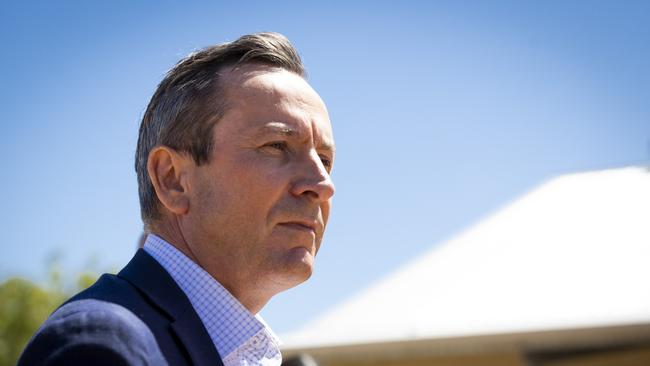
That means New Zealanders can undertake quarantine-free travel to Western Australia, but they will need to complete a G2G pass.
“This is an encouraging step forward,” Premier Mark McGowan told reporters on Friday.
Queensland will also transition to a “very low risk” state from April 19.
Meanwhile, Western Australia will allow major sport and entertainment venues with fixed seating to have 100 per cent capacity from midnight on Saturday.
Mr McGowan said that included Optus Stadium and RAC Arena, as well as theatres, cinemas and places of worship.
“This is a big step forward in the removal of restrictions and one that we can only take due to the hard work from West Australians across the community, giving health experts the confidence to proceed,” he said.
The 75 per cent limit for restaurants, clubs and cafes with dedicated seating, and the two square metre rule for pubs, nightclubs, bars and other music events, will remain in place for now.
READ MORE:Travel stocks hit by vaccine uncertainty
Greg Brown3.30pm: National cabinet to examine women’s economic security
A face-to-face national cabinet meeting will be held in Darwin in July to work on a nationwide plan to improve women’s economic security.
The meeting will be held ahead of a women’s safety summit to be held on July 30-31.
Scott Morrison said the meeting will bring together all of the initiatives and programs that are being run by state and federal governments on women’s economic security.
“There will be a special package brought together by the Secretary of Treasury that will be identifying the issues that relate to women’s workforce participation, gender pay gaps and issues related to those to aid that discussion,” the Prime Minister said.
“The purpose here and what we will consider in July, is whether we can then move - and I hope we do and I think that is the shared view of premiers and chief ministers - that we can embark on a similar national plan process on women’s economic security as we have on the protection of women against violence.”
Charlie Peel2.45pm: Queensland widens Pfizer rollout to all hospitals
Every Queensland hospital will be equipped with the capability to administer the Pfizer vaccine under new plans to make it more readily available in regional and remote areas.
The expanded rollout was prompted by issues emerging with the AstraZeneca vaccine that led to blood clotting in some rare cases.
Chief Health Officer Jeannette Young announced the changes following Friday’s national cabinet meeting.
Previously, the Pfizer vaccine was to be administered only at a select few major hospitals.
Dr Young said recent studies of the stability of the vaccine, which is normally kept at minus 70 degrees Celsius, showed it can be stored in the temperature of a normal freezer for two weeks or at fridge temperature for up to five days before use.
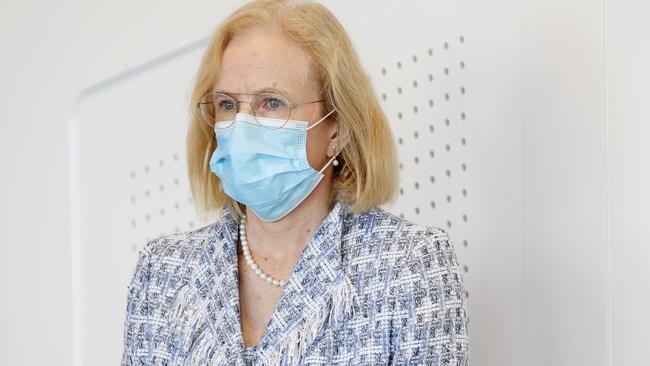
“Because of these changed storage requirements, we will be putting a Pfizer hub in every single hospital and health service,” she said.
“Originally they were only going to be in the larger ones but now they will be across the whole state.”
Dr Young and Premier Annastacia Palaszczuk welcomed the Prime Minister’s announcement that Australia had secured an additional 20 million Pfizer doses.
Nicholas Jensen2.40pm: NSW lifts pause, resumes AstraZeneca jabs
The NSW government has resumed administering the AstraZeneca vaccine to all age groups after a brief pause to update clinical consent services.
“The only reason we took a pause this morning was to update all of our clinicians, our workers, to make sure they had the latest advice which came out very late yesterday evening,” Premier Gladys Berejiklian said.
Earlier today Health Minister Brad Hazzard said the state government had confidence in Australia’s vaccine program, despite temporarily halting the rollout of the AstraZeneca jab this morning.
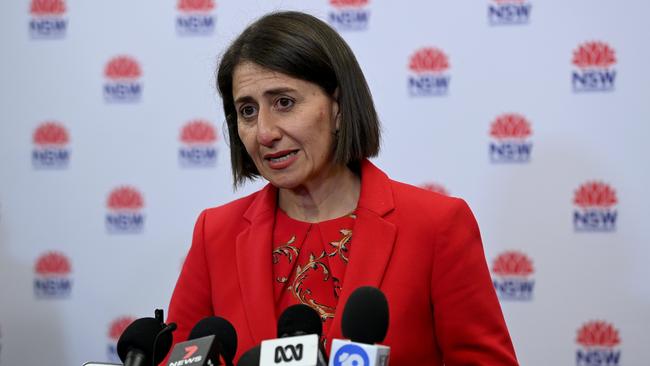
The AstraZeneca rollout was resumed at 1pm.
Mr Hazzard said it’s simply “because we had a large number of people booked in and we’ve got to check their ages and make sure the issues are discussed with them.”
In this afternoon’s press conference, Ms Berejiklian, who turned 50 last year, said she intended to get a second dose of the AstraZeneca vaccine.
“It’s really important for people to assess their own health risks. If you’re over 50, you should not be overly concerned with getting that AstraZeneca vaccine,” she said.
“The chances of you acquiring or getting an adverse reaction is very low.”
Greg Brown2.30pm: PM’s mother booked for AstraZeneca vaccine jab
Scott Morrison says his mum is getting the AstraZeneca jab in “a couple of weeks”, as he moves to downplay concerns over the vaccine.
“She told me she is booked in and she is looking forward to having her AstraZeneca vaccine and she was pretty happy for me to tell people about that,” the Prime Minister said.
Mr Morrison said the government never instructed people to not take the AstraZeneca vaccine.
“There is an acknowledgment of the risk that is there but as is the case always with these matters these are decisions for Australians,” he said.
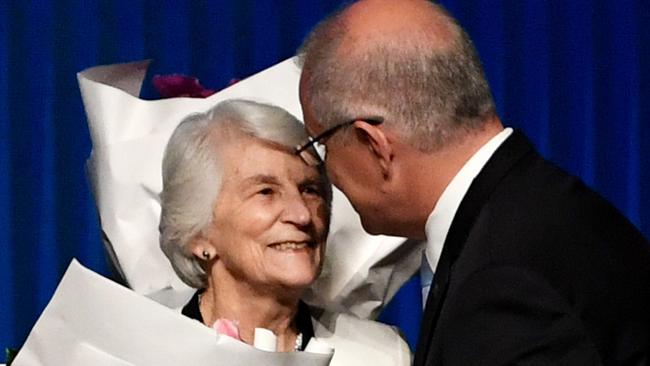
“Certainly for those who are over 50 there is a strong encouragement to be taking this AstraZeneca vaccine which we discussed today to ensure that we can continue down the path of the vaccination roll out.
“The goal here is to protect the most vulnerable in our community. If we want to treat COVID-19 like the flu then we need to ensure that we’re vaccinating those in our community who are most vulnerable.
“The most vulnerable people in our community are not just over 50, they are actually a lot older than that. The AstraZeneca vaccine is well suited to address those critical vulnerable groups.”
READ MORE: Our AstraZeneca vaccine is still needed: CSL
Greg Brown2.05pm: National cabinet endorses ‘less restrictive’ indoor venue limits
State and territory governments have backed an easing of restrictions, including allowing 100 per cent capacity for large, ticketed and seated events.
National cabinet has also endorsed a maximum restriction of one person per two square metres at indoor venues.
“I know that states have moved to make it even less restrictive than that and others will be doing so very soon,” Scott Morrison said.
The Prime Minister said that national cabinet had tasked the Australian Health Protection Principal Committee with providing advice on how vaccinated Australians could travel overseas.
“What we are asking the medical expert panel to tell us is what are the thresholds that we need to be able to meet to do things such as the following: Australians who are vaccinated being able to travel overseas and return to Australia and not go into hotel quarantine, potentially go into hotel quarantine or not even into home quarantine at all,” Mr Morrison said.
“That will be a major change and to extent to which Australians returning from overseas, who have had recognised vaccines also approved here in Australia with appropriate accreditation, can return to Australia on that same basis and to enable potentially down the track travel from low-risk countries with similar vaccine arrangements.”
READ MORE:Possible virus case halts Sydney Airport flight
Greg Brown1.52pm: More than 1m vaccine doses already administered
More than 1 million doses of COVID-19 vaccines have been administered in Australia, as national cabinet strikes an agreement to release daily statistics about the distribution of the vaccine.
The agreement will include daily and weekly statistics on the delivery of the vaccines by state, territory and federal governments.
There have been 81,297 delivered in the past 24 hours.
READ MORE:Media noise hides good news on jab rollout
Greg Brown1.30pm: PM: 20m extra Pfizer vaccines ordered
Scott Morrison says Australia has struck a deal with Pfizer for an extra 20 million vaccines, as concerns grow about the safety of the AstraZeneca job.
The Prime Minister said the overnight agreement would ensure Australia would now have access to 40m Pfizer jabs this year.
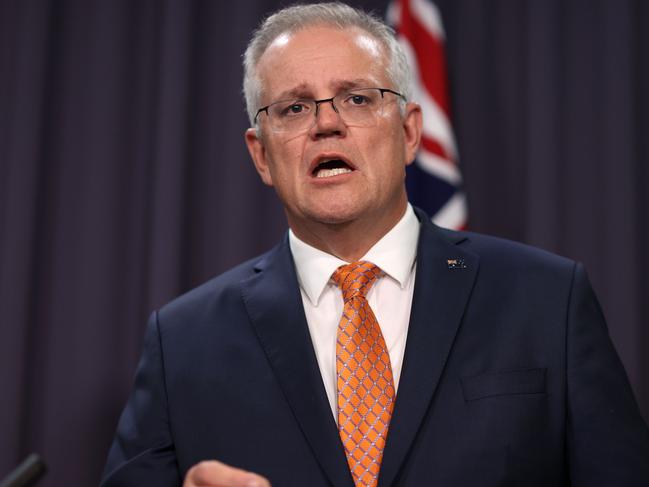
“Through our advance purchase agreement with Pfizer, these additional 20m Pfizer doses means that Australia will now receive a total of 40m Pfizer doses in 2021,” Mr Morrison said.
“It is anticipated that these additional 20m doses will be available in quarter four of this year, that’s our current instruction, and we will obviously be doing everything we can to seek to move that forward where we can.”
Mr Morrison released new advice on Thursday night, recommending people under the age of 50 do not take the AstraZeneca vaccine because of concerns of blood clotting.
Erin Lyons 12.55pm:Urgent testing as airline crew tests positive
Urgent testing is under way after an airline crew member tested positive for COVID-19, halting a flight from Sydney to Los Angeles.
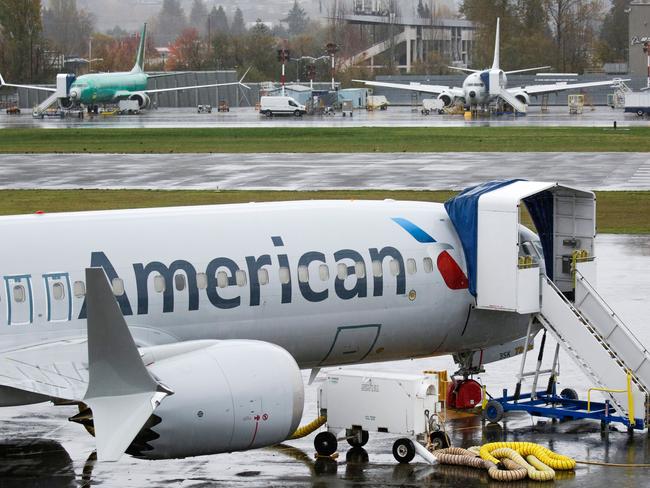
The American Airlines flight was scheduled to depart Sydney just after 9am on Friday but was postponed due to a “possible COVID-19 case in a flight crew member”.
“The crew member was tested as part of routine surveillance. They are currently in special health accommodation,” NSW Health said in a statement.
Health officials are now waiting for the results of urgent blood tests to determine if this potential case is an historical infection.
Other crew on-board the AA72 flight are considered close contacts and are in quarantine in a Sydney hotel.
“There is no risk to the broader community,” NSW Health said.
READ MORE:Call to ease foreign student visa limits
Greg Brown12.50pm:Frydenberg rules out reinstating JobKeeper
Josh Frydenberg has ruled out reinstating the JobKeeper payment, amid concerns a delay in the vaccine rollout will damage the economy.
The Treasurer said JobKeeper was “always meant to be a temporary measure”, after ACTU secretary Sally McManus called for the payment to be reinstated for businesses impacted by the travel restrictions because of the delay of the rollout.
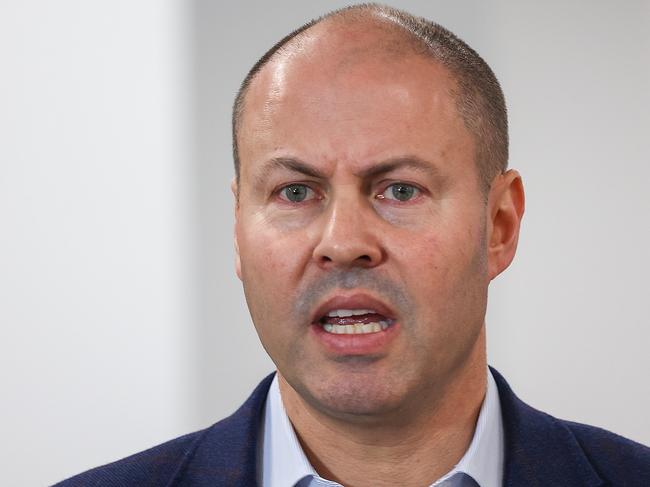
Mr Frydenberg said retaining the wage subsidy program would be “counter-productive to the economy”.
“We must remember that every dollar we spend is a borrowed dollar. And we have now moved to the next stage of the economic recovery plan with more targeted support,” Mr Frydenberg told 3AW radio.
“You’ve heard the government announce support for the arts and entertainment sector for live events to be held, support the tourism and the aviation sector with half price airfares, cheap loans that are available to businesses to help them get to the other side.”
Mr Frydenberg said the lowering unemployment rate was evidence the economy was improving.
“As the economy strengthened if we left JobKeeper in place, it would actually be counter-productive to the economy and prevent workers moving more freely to other jobs across the economy,” Mr Frydenberg said.
READ MORE:Morrison makes a small target
Nicholas Jensen12.20pm:NSW Health pauses AstraZeneca to all age groups
NSW Health says the government is temporarily pausing the administration of the AstraZeneca vaccine to all age groups while it updates its informed consent information.
However, AstraZeneca vaccinations for those aged 50 years and over are set to recommence later on Friday, after the informed consent information is updated.
A statement from the Australian Technical Advisory Group on Immunisation (ATAGI) on the AstraZeneca COVID-19 vaccine in response to new vaccine safety concerns can be read here: https://t.co/qdBxRXtgPq
— NSW Health (@NSWHealth) April 9, 2021
Following the new advice from the commonwealth last night, informed consent information will be updated to provide patients and those administering the AstraZeneca vaccine with the latest information,” a spokesperson from NSW Health said.
“As with all other vaccines, informed consent is required before administering COVID-19 vaccines, ensuring recipients make decisions based on an understanding of the risks and benefits.”
NSW Health said the Pfizer vaccine would continue to be administered at clinics.
READ MORE:Moderna antibodies last six months
Nicholas Jensen11.30am: NSW also reports no new local cases
NSW has recorded no local cases of COVID-19, with two cases of the virus recorded in hotel quarantine.
There were 14,078 test results received across the state in the past 24 hours, with health officials monitoring 40 active cases, none of whom are in ICU.
Most of these cases are being treated in non-acute, out-of-hospital care, including returned travellers in the Special Health Accommodation.
NSW Health said 6173 vaccinations were administered on Monday, bringing the total number to 146,724.
NSW recorded no new locally acquired cases of #COVID19 in the 24 hours to 8pm last night.
— NSW Health (@NSWHealth) April 9, 2021
Two new cases were acquired overseas, bringing the total number of cases in NSW since the beginning of the pandemic to 5,131. pic.twitter.com/0jaBI5iHKQ
Ewin Hannan11.25am:ACTU wants JobKeeper back for travel sector
ACTU secretary Sally McManus has called for JobKeeper to be reinstated for businesses impacted by travel restrictions and lockdowns given the vaccine rollout “will be delayed”.
Ms McManus said federal support remained necessary as much of the under-50 population no longer eligible for the more accessible AstraZeneca vaccine worked in industries most affected by lockdowns, including tourism, hospitality and retail.
Ms McManus said there could be no return to pre-pandemic economic certainty until the vaccine rollout was delivered.
“Now that the rollout will be delayed, the government must ensure that businesses and their employees are not abandoned by reinstating JobKeeper to all those impacted,” she said.
“Australia is currently 3.4 million jabs behind schedule and it’s still in question if everyone will be vaccinated this year. We’re nowhere near back to normal and for our recovery to continue there needs to be continued support”.
Nicholas Jensen11.10am:AZ boss must support vaccine reputation: investors
Chief executive of AstraZeneca, Pascal Soriot, has been criticised by investors for failing to defend the effectiveness of the company’s vaccine, suggesting he has not adequately promoted its benefits amid growing fears it could be linked to rare blood clots.
Mr Soriot has been in Australia with his wife and children since Christmas, according to the UK Telegraph, with investors saying he has been absent and not defending the company.
Ketan Patel, a fund manager at EdenTree Investment Management, which has a stake in AstraZeneca, said Mr Soriot’s absence “did not give the right signal or message”.
“If we were grading the PR effort, they could do better,” he told the Telegraph.
“If you look at the data, and see that the chances of getting a blood clot with this vaccine is about four in one million, compared to four in 10,000 for the contraceptive pill, that perspective needs to be highlighted.”
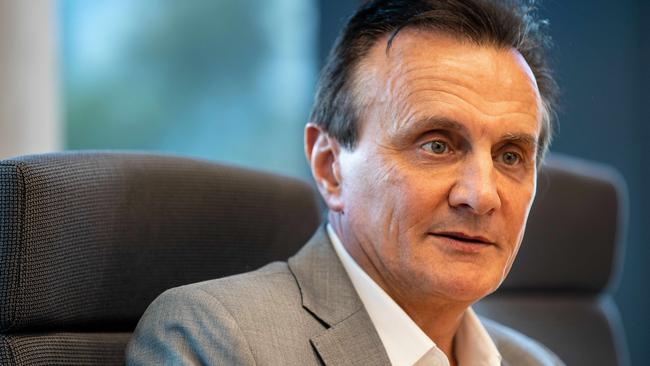
“Where is the chief executive in terms of articulating the healthcare benefits? He hasn’t been that public and being halfway around the world doesn’t give the right signal or message,” Mr Patel said.
Earlier this week AstraZeneca suffered a further setback when the UK Medicines and Healthcare products Regulatory Agency (MHRA0 warned over a possible link between the jab and rare brain blood clots. It came after a number of European countries suspended its use due to concerns over blood clotting.
Mr Soriot has been credited with reviving the business by developing new oncology drugs and putting greater emphasis on research and development.
AstraZeneca’s share price has fallen by a fifth since last July.
A spokesperson for AstraZeneca said Mr Soriot would return to the company’s European offices after travel restrictions were eased.
“Travel restrictions and local lockdowns mean it makes little sense to be travelling right now, particularly given that many countries require quarantine,” the spokesperson said.
Nicholas Jensen11.05am: Pfizer says it fills local commitment
Pharmaceutical giant Pfizer has released a statement saying it is “on track to meet its commitments of 20 million doses” to Australia throughout the course of 2021.
The company said it was continuing to have “ongoing constructive discussions” with the Australian government.
“More than one million doses have been delivered and we continue to be on track to meet our commitments.”
“Pfizer is committed to working collaboratively with all governments to support the global public health need for COVID-19,” the statement read.
Jared Lynch 11.03am:CSL ‘fully committed’ on AZ delivery
Australia’s biggest health company CSL says it “remains committed” to fulfilling its contract with the federal government to produce 50 million doses of the AstraZeneca COVID-19 vaccine, despite health advisers warning Australians under 50 not to get the jab.
Prime Minister Scott Morrison announced a “major recalibration” to the nation’s coronavirus vaccine program on Thursday night, with the government forced to rely on the imported Pfizer vaccine or yet-to-be approved Novavax vaccine to inoculate those under 50.
While the move has cast doubt on whether the whole population will be vaccinated against COVID-19 by October, CSL has declared it is business as usual at its two Melbourne factories which are producing the AstraZeneca vaccine.
A CSL spokeswoman said, following Mr Morrison’s announcement, that the locally produced doses of the AstraZeneca vaccine “remains critical for the protection of our most vulnerable populations”.
“CSL remains committed to meeting its contracted arrangements with the Australian Government and AstraZeneca for locally produced AstraZeneca COVID-19 vaccines,” a CSL spokeswoman said on Thursday night.
CSL shares were trading flat on Friday morning at $266.
FULL REPORT is here
Rhys Blakely11am:Results bolster confidence in Moderna longevity
People who have been given the Moderna vaccine still have antibodies capable of neutralising the coronavirus six months after their second shot, a study has shown.
The results will bolster confidence in the longevity of protection from the Moderna jab, which started to be administered in Britain this week.
The study looked at blood samples taken from 33 healthy adults in a large clinical trial that was held in the US last year. Six months after they had been fully immunised, antibody levels were strong across all age groups.
The rate at which the antibodies were decaying was consistent with that seen in people who had contracted the virus naturally. The results were published in The New England Journal of Medicine.
FULL REPORT is here
Nicholas Jensen10.45am:Hunt says vaccine contracts ‘in place’
Health Minister Greg Hunt has rejected claims that the government did not secure enough vaccine agreements, saying despite the new recommendation on AstraZeneca for under 50s “the vast bulk of the program remains unchanged”.
“We secured five agreements and nobody knew which vaccines would be successful.” Mr Hunt told Sky News this morning. “There had never been an mRNA [messenger RNA] vaccine that was produced for any time and there had never been a coronavirus vaccine.’’
Mr Hunt pushed back against suggestions that the government did not follow expert advice regarding the acquisition of different vaccines, saying it followed the advice and have secured key contracts.
“We have four vaccine deals in place: 870,00 Pfizer doses already here, 20 million ordered, and we have 130,000-150,000 arriving a week currently, and increases that are due in May and July.”
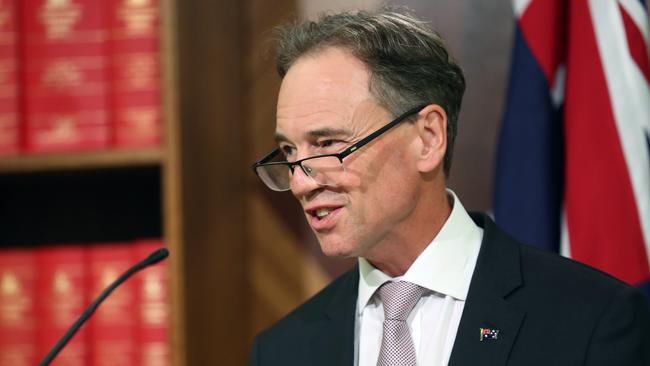
Asked if the new recommendation on AstraZeneca would delay the rollout, Mr Hunt said “it will have an impact on the timing for now for those under 50” but refused to say it would have a significant impact on timelines and the government’s October deadline.
Mr Hunt said he was satisfied with the vaccinations that had already taken place: “The states have overwhelmingly completed their frontline health workers and overwhelmingly completed their hotel quarantine and border workers.”
In response to the new advice on AstraZeneca, Mr Hunt said the government will look into all options.
“I certainly won’t rule out any additional purchases,” Mr Hunt said. “But for reasons of intense global competition I will not pre-empt anything.”
“Australia in a position which is very different to the rest of the world because of that medical advice and although it was a difficult decision (border closures), we didn’t hesitate to make it.”
READ EARLIER:Blood clot fears force AZ switch
Nicholas Jensen9.45am:Albanese blasts rollout, calls for more varieties
Opposition leader Anthony Albanese has called the government’s vaccine rollout a debacle, saying it did not consider access to a wider range of available vaccines, which could have redressed current shortfalls.
“We now have circumstances whereby just under 20 per cent of aged-care residents have been vaccinated,” he said this morning in a press conference. “They have stopped promising to roll out the vaccine to aged-care staff and are now telling aged-care staff to check with their GP.
“Labor was warning for a long period of time that we needed to do what international best practice told us we should do and that was to have access to five or six vaccines.”
Mr Albanese said that uncertainty concerning the rollout was “a direct result of an arrogant government that was too focused on the 24-hour media cycle and not focused on what Australia needed”.
“Scott Morrison is addicted to the spin cycle rather than to substance,” he said.
Mr Albanese said more should have been done to “hedge our bets”.
“We knew, just like the UQ vaccine fell over, there can be issues with the rollout of a vaccine … which is why international best practice would have had us do deals over Moderna, over Johnson & Johnson.”
Nicholas Jensen9.20am:Qld reports no new local infections
Queensland has recorded no local cases of COVID-19 in the last 24 hours, with one case recorded in hotel quarantine.
There were 9734 test results received across the state yesterday.
Queensland health authorities are currently monitoring 63 active cases.
READ EARLIER:Comment: Wait for ‘new normal’
Nicholas Jensen8.55am:No new cases recorded in Victoria
Victoria has recorded no new cases of COVID-19 in the last 24 hours.
Yesterday there were no new cases reported.
— VicGovDH (@VicGovDH) April 8, 2021
- 6,057 vaccine doses were administered
- 18,463 test results were received
Got symptoms? Get tested.
More later: https://t.co/0xmnS4N9DN#COVID19Vic#COVID19VicDatapic.twitter.com/eaNzgizDmR
There were 18,463 test results received across the state in the past 24 hours.
Victorian Health said 6057 vaccinations were administered on Sunday, bringing the total number to 137,320.
READ MORE:Victorian quarantine staff refuse vaccine
Nicholas Jensen8.46am:Time to readjust to shortfalls: Former AMA president
Former president of the Australian Medical Association Dr Tony Bartone says “it is important we now instil confidence back in the rollout program” following news of vaccine shortfalls and changes to advice on AstraZeneca for under 50s.
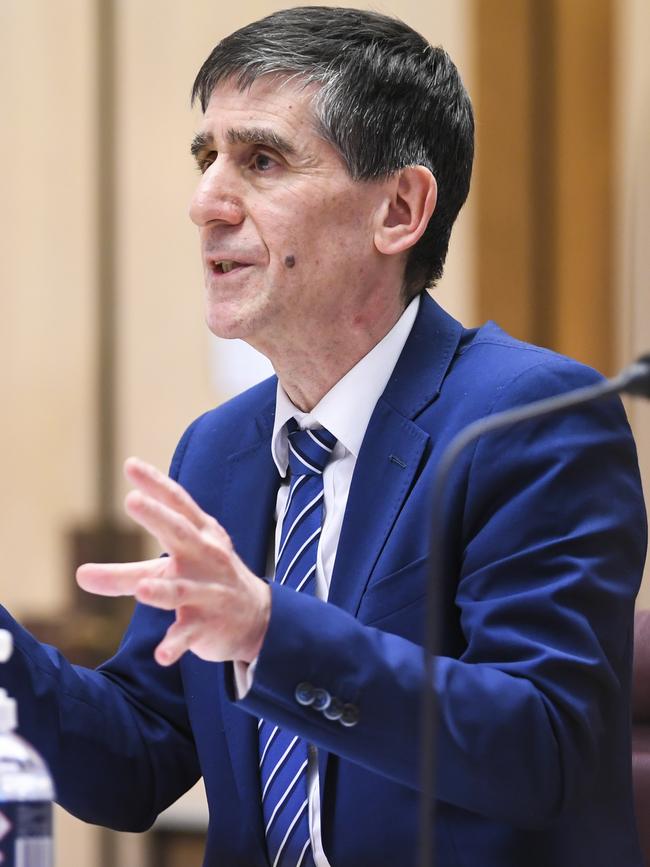
“These shortfalls will be putting questions in the minds of the Australian community,” he told Sky News this morning. “We need to ensure we get back to the task at hand, and that is that we have no other option but to continue with our vaccination program.
“If we want to see our lifestyles return to some sort of sense of normality in the long run we need to trust vaccines … we need Australians to continue, especially in this current phase, to continue to have that vaccination.
“The incidents of this (blood clotting) are rare, but it’s a very serious condition, and in particular the reports, which are varied in parts of the literature, show a predilection to younger members of the population.
“We’re still getting more information and it made the decision to proceed with the analysis and continuing on that.”
Dr Bartone said there is time enough to refine the rollout and adjust for shortfalls.
“The Phase 2B segment will be coming up in the middle of the year means we have time … we have time to look at our diversified vaccine portfolio and reach into finding the one that’s most appropriate.”
READ MORE:Quarantine staff refuse vaccine
Nicholas Jensen8.30am:Nothing off table in jab rollout: CMO
Chief Medical Officer Paul Kelly has reiterated calls for Australians to maintain confidence in the vaccination rollout, saying “nothing is off the table” in order to redress the shortfall.
“Of course something like the announcements overnight can affect vaccine confidence,” he told the ABC this morning. “But the important thing is for the Australian public to know that as soon as we’ve known something, as soon as our expert advice from the ATAGI group gives us the guidance on immunisation, we went out and informed the public.
“We’ve made this preference for not using AstraZeneca in the under 50s on the basis of that safety concern but I would really urge people to make sure that they are lining up when it’s their turn.”
Following the change in advice, Professor Kelly said “nothing is off the table”, suggesting that the government was considering a deal with Moderna to redress vaccine shortfalls.
“We are looking at all of those options right now. We know that Novavax – we have 51 million doses on order – is not yet approved by the TGA.
“The TGA will absolutely expedite that matter and as soon as Novavax is ready to supply to Australia we will be going through those processes,” he said.
Professor Kelly refused to say there was a problem with the vaccine rollout, saying the issue would be discussed at today’s cabinet and that he will “not pre-empt those discussions”.
READ MORE:Clot fears force vaccine switch
Courtney Walsh8.25am:French Open on the move again
For the second year in succession, the coronavirus crisis has forced tennis officials to postpone the French Open.

But unlike the 2020 clay court championship, which was shifted to October, the delay this year will only be for one week, with the country hopeful it will be over the worst of what is effectively a third wave of the virus.
The shift in the calendar will again disrupt other lower-tier events being held as warm-ups to Wimbledon, with the gap between the French Open and the All England Club Championships now only two weeks.
Nicholas Jensen8.03am:Lies, deception plague WHO probe
Three senior Australian scientists are among 24 international researchers to have denounced the World Health Organisation’s probe into the origins of COVID-19, saying wilful politicisation, lies and deception have stymied proper scientific inquiry and access to vital evidence.
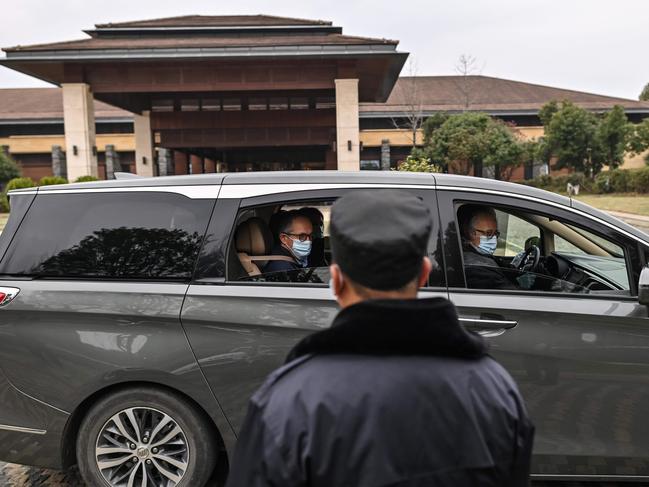
This week, professors Colin Butler, Nikolai Petrovsky and Rosemary Mcfarlane joined 21 others in penning an open letter to the WHO calling for another full investigation into the origins of the pandemic. “What we want is a situation where proper scientific method and inquiry can be pursued without corrupt politicisation,” Professor Petrovsky said. “Now we’re hearing from the WHO that they never said they were conducting an investigation.”
Professor Petrovsky, whose research group at Flinders University uses artificial intelligence modelling to understand whether a particular species started a virus transmission, said the WHO investigation succumbed to pressure and became highly politicised. He said the WHO was not the right international institution to conduct such a probe. “We need a new international mechanism that compels countries to permit proper investigations into these issues,” he said.
Nicholas Jensen7.35am:TGA approves new Pfizer storage method
The Therapeutic Goods Administration has agreed to make it easier to store and transport the Pfizer vaccine, as the government changes its advice on the use of AstraZeneca in people under 50 years of age.
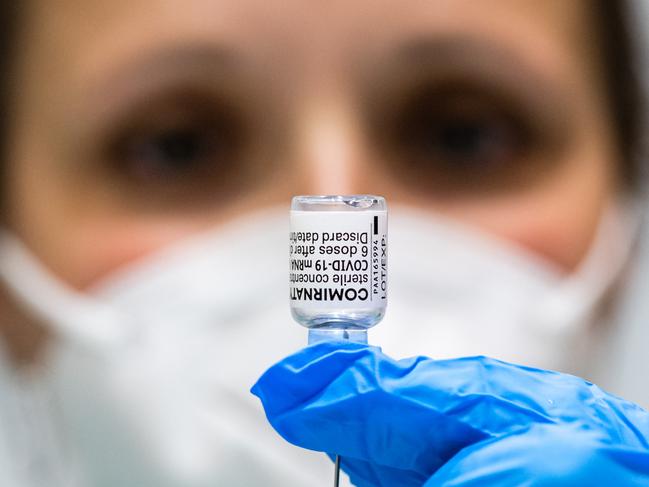
The TGA will now permit unopened vials of the jab to be stored and distributed at -15C for up to two weeks.
Previously the vaccine was stored at a temperature 10 degrees cooler over the same time period, but a temperature between -90C and -60C will continue to be required for longer term storage and transport.
Last night Prime Minister Scott Morrison said the Pfizer vaccine is now the preferred vaccine over AstraZeneca for Australians aged under 50, signalling a dramatic change to the country’s rollout.
READ MORE:Tech ‘can open up more borders’
Jess Malcolm7.00am:CSL committed to vaccine rollout despite AZ call
Commonwealth Serum Laboratories says it respects the decision taken by the Australian government, and reiterates that blood clotting is “an extremely rare” side effect of the AstraZeneca vaccine.
CSL is the only company capable of producing vaccines onshore currently, and is responsible for Australia’s domestic AstraZeneca supply.
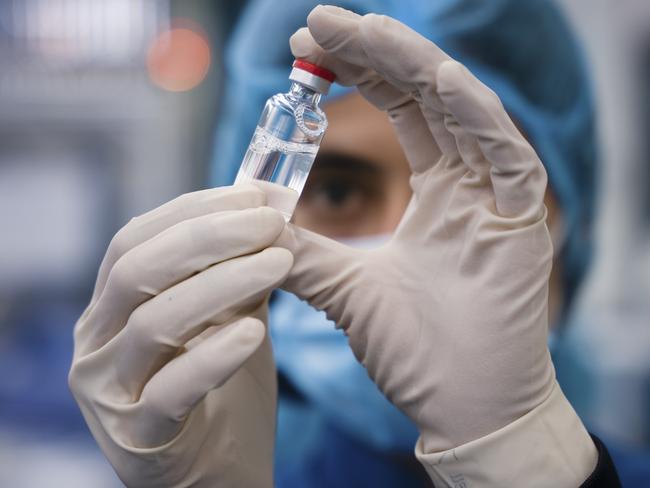
“Regulators around the world, including the Therapeutic Goods Administration (TGA), have reviewed the rare clotting events and did not identify any risk factors, such as age or gender, or a definite cause for these extremely rare events,” the statement read.
“However, they came to the view that these events have a possible link to the vaccine and requested they be listed as an extremely rare potential side effect.”
“Whilst concerning, the events under assessment are very rare, with low numbers reported among the almost 200 million individuals who have received the AstraZeneca COVID-19 vaccine around the world.”
CSL said it is still committed to providing vaccines in the nation’s rollout, in light of Thursday evening’s changes to the use of the AstraZeneca jab.
“CSL remains committed to meeting its contracted arrangements with the Australian government and AstraZeneca for locally produced AstraZeneca COVID-19 vaccines,” the statement read.
“We will continue our focused and important efforts to manufacture this vaccine which remains critical for the protection of our most vulnerable populations.”
“We are proud of our unique role in Australia as the only onshore manufacturer that can produce this vaccine and remain dedicated to our ongoing contribution towards this effort.”
READ MORE:Blood clot fears force vaccine switch
Nicholas Jensen6.45am:AZ call shouldn’t ‘undermine confidence’ in rollout
Infectious disease expert Dr Paul Griffin has urged Australians to trust the country’s regulator, saying advice on the AstraZeneca vaccine should not “undermine our overall confidence” in the rollout.
“They (the federal government) have exercised an abundance of caution and the thing to keep in mind is it is extremely rare, we’re talking a few cases per million doses and the majority of those people will recover,” he told Nine’s Today show.
Dr Griffin said that clotting symptoms have been well publicised and “typically happens between day four and 20 post-vaccine”.
“We should have faith in the decision and the abundance of caution we’re taking.”
Dr Griffin said Australians should remain optimistic about the rollout, but warned there will be major delays.
“Novavax hasn’t completed the clinical trial data needed to use in this country. That is many months away … It is going to take a significant amount of time.”
READ MORE: AstraZeneca vaccine explainer: your questions answered
Nicholas Jensen6.25am:Spain widens use of AstraZeneca jab
The use of the AstraZeneca vaccine is set to widen in Spain to include people between the ages of 66 and 69 amid fears the jab could be linked to rare cases of blood clotting.
“The aim is to complete the inoculation of the people who are most vulnerable of COVID-19 as soon as possible,” read a statement from the Spanish health ministry.
The change was based on advice by the European Medicines Agency which has encouraged countries to continue using the AstraZeneca vaccine, insisting that the benefits far outweigh the risks.
The Spanish government said a decision would be taken soon on how to proceed with people under 60 who have already received one of the two doses of the vaccine.
Health officials in Madrid aim to have 70 per cent of the population vaccinated by August.
At the moment Spain has vaccinated under seven per cent of its population of 47 million people with two doses and administered jabs to more than 9.8 million people.
Spain is among the European countries hardest-hit by the pandemic with more than 3.2 million infections and over 76,000 deaths.
READ MORE:Vaccine batch ‘not delivered’ to Victoria
Nicholas Jensen6.15am:AstraZeneca move ‘not unusual’: British officials
British health officials and ministers have reassured Britons that the AstraZeneca vaccine remains a reliable and effective form of inoculation, saying that it was not unusual that people under 30 should be offered alternative jabs and that it would not impact the pace of the country’s rollout.
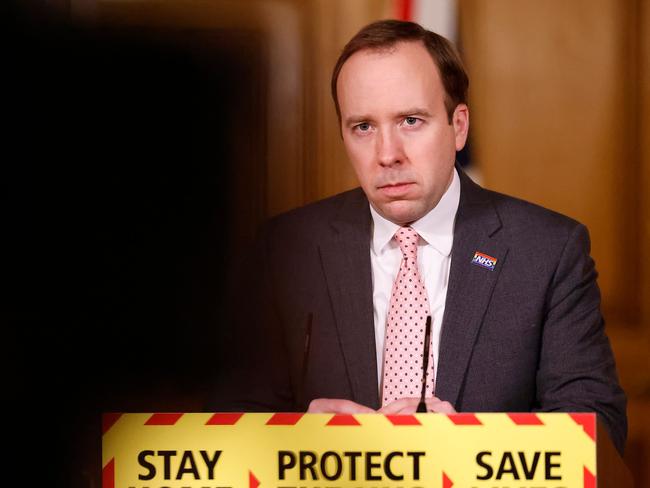
Health officials said the suggestion that under 30s should be offered an alternative vaccine did not reflect any serious safety concerns, only a “vanishingly rare possible side effect”.
Deputy Chair of the Joint Committee on Vaccination and Immunisation Anthony Harnden said it wasn’t an unusual step, pointing out that people of different ages had already received different flu shots.
“This isn’t unusual and this is not undermining what the regulators are saying,” he said.
“The regulators are saying this vaccine is suitable for all age groups, but it’s up to the individual countries to decide how best to deploy those vaccines.”
Britain’s Health Secretary Matt Hancock defended the advice, saying that transparency over potential side effects should bolster confidence in the rollout.
READ MORE:AstraZeneca vaccine explainer: your questions answered
Ewin Hannan6.00am:Call to ease foreign student work visa limits
International students should be able to work unlimited hours and foreign backpackers continue with the same boss for more than six months under a temporary easing of visa restrictions being sought by employers to address COVID-driven labour shortages until overseas travel resumes.
National business groups urged the Morrison government to temporarily remove the cap on international students working more than 40 hours a fortnight and allow unrestricted hours in targeted regions and industries including hospitality, accommodation, cafes and restaurants that are facing shortages.
Employers also called on the government to expand the priority migration skilled occupation list to include chefs, veterinarians, cafe and restaurant managers and seafarers.
Remy Varga5.40am:Victorian quarantine staff refuse vaccine
With Rachel Baxendale
A number of workers at Victoria’s hotel quarantine program have refused the COVID-19 vaccine and have been stood down with full pay. Some have declined the vaccine on medical grounds, but The Australian is aware of at least one worker who refused the jab out of concern it could affect her fertility. A spokeswoman for COVID-19 Quarantine Victoria, the agency responsible for the state’s hotel quarantine program, said they were looking for alternative work for unvaccinated staff members who were not permitted to work at the hotels.
“All staff members working at our active quarantine hotels must have had at least their first vaccination; if they have not been vaccinated, they cannot work a shift in the hotels,” she said. “We are working with the small number of staff who remain unvaccinated on alternative work arrangements outside of the hotels.”
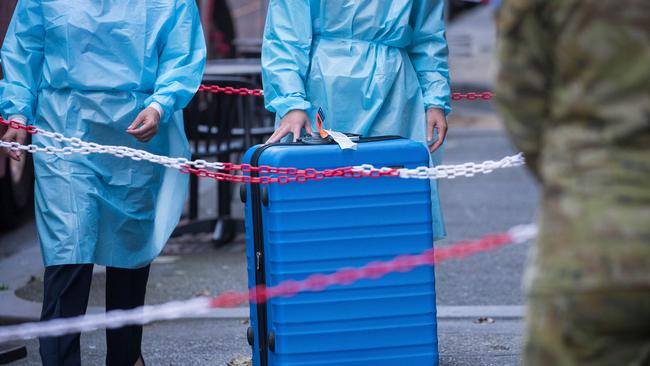
Opposition police and crime prevention spokesman David Southwick said receiving the COVID-19 jab should have been stipulated in the contracts of hotel quarantine workers.
“Anyone has the right to refuse a vaccination but this should have been a condition of employment for working in hotel quarantine,” he said. “No one should be sitting at home on full pay doing nothing.”
But employment law expert and partner at law firm Swaab Michael Byrnes said standing down staff with full pay avoided exposure to unfair dismissal laws.
Natasha Robinson5.30am:Blood clot fears force AstraZeneca switch
Australians aged under 50 will not be given the AstraZeneca vaccine under recommendations from the nation’s health advisers that have cast doubt on plans to give the whole population a jab by October.
Scott Morrison on Thursday night said a major “recalibration’’ would be required to the vaccination program for under-50s, with the government forced to rely on the imported Pfizer vaccine or the yet-to-be-approved Novavax to complete the program.
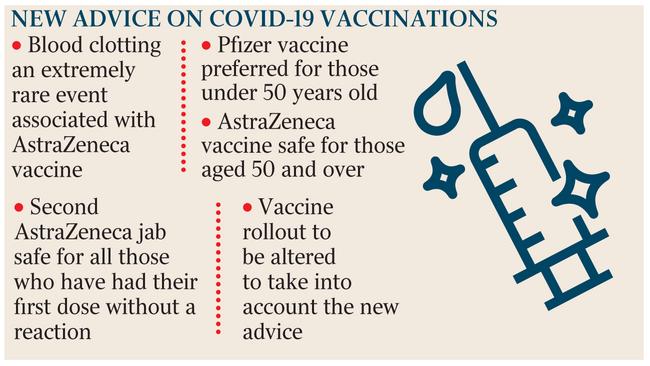
Responding to the findings of the European Medicines Agency that there was a link between the AstraZeneca dose and a rare blood-clotting syndrome, the Australian Technical Advisory Group on Immunisation recommended the Pfizer vaccine now be given in preference to AstraZeneca for people aged under 50.
ATAGI advised that the AstraZeneca vaccine, which is made locally, was safe for those aged over 50, and said those in priority groups aged under 50 who had already been given one AstraZeneca shot could safely receive the second jab.

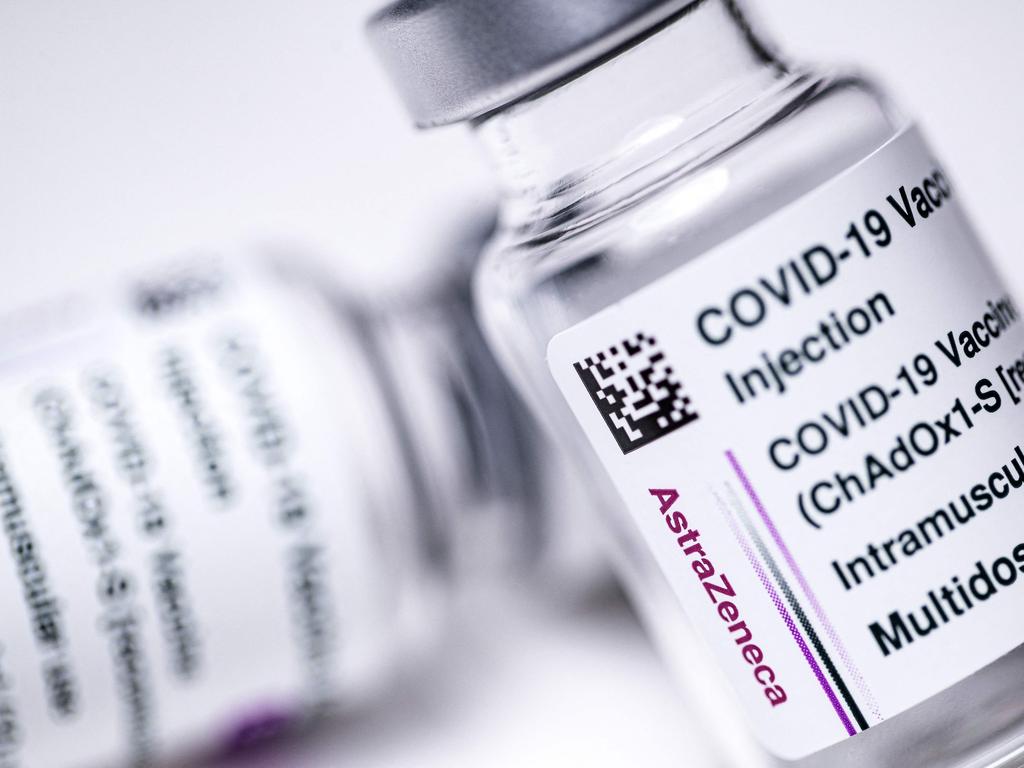


To join the conversation, please log in. Don't have an account? Register
Join the conversation, you are commenting as Logout